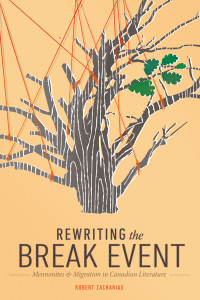Rewriting the Break Event: Mennonites and Migration in Canadian Literature

Robert Zacharias
Year of Publication: 2013
Publisher website
Despite the fact that Russian Mennonites began arriving in Canada en masse in the 1870s, much Canadian Mennonite literature has been characterized by a compulsive telling and retelling of the fall of the Mennonite Commonwealth of the 1920s and its subsequent migration of 20,000 Russian Mennonites to Canada. This privileging of a seminal dispersal, or “break event,” within the broader historic narrative has come to function as a mythological beginning or origin story for the Russian Mennonite community in Canada, and serves as a means of affirming a communal identity across national and generational boundaries.
Drawing on recent work in diaspora studies, Rewriting the Break Event offers close readings of five novels that retell the Mennonite break event through specific narrative strains, including religious narrative (Al Reimer’s My Harp is Turned to Mourning), ethnic narrative (Arnold Dyck’s Lost in the Steppe), trauma narrative (Sandra Birdsell’s The Russländer), and meta-narrative (Rudy Wiebe’s Blue Mountains of China). The result is an exciting new methodology through which to examine not only the shifting contours of Mennonite collective identity but also the discourse of migrant and minoritized writing in Canada.
